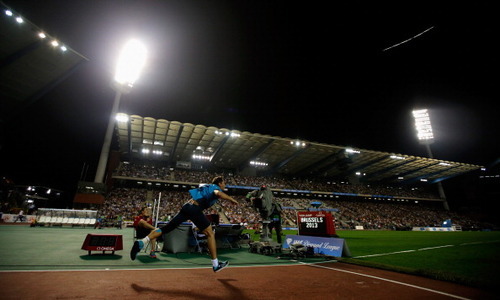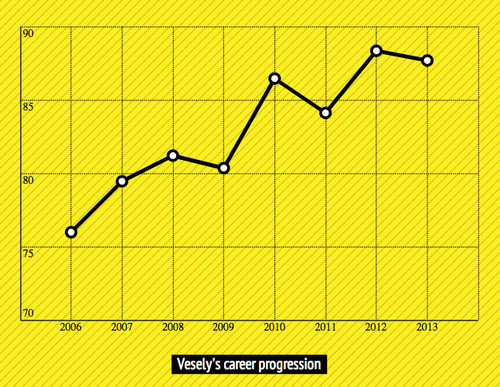Viteslav Vesely at Moscow 2013
World javelin champion Víteslav Vesely tells SPIKES how, inspired by world record holder and coach Jan Zelezny, he overcame injury and nerves to win big in Moscow.
When Víteslav Vesely hit the javelin runway at the Moscow 2013 World Athletics Championships, he knew he had to gamble.
The pre-event favourite had been the season’s most consistent javelin thrower coming into the championships, boasting three Diamond League victories and a series of top class performances.
But he had been the favourite before. Vitezslav is always the bridesmaid, but not usually bride. And he was injured.
“Suddenly, I was not so sure about my performance,” Vesely tells SPIKES. “I knew I had just one or a maximum two chances to throw far in the final. I could not even run during training two weeks before Moscow and I had to take painkillers just to survive.”
His flagging spirits were lifted by a huge first round throw in qualifying. Although it was a foul, he went on to qualify comfortably for the final in fifth.
“I started to feel comfortable and confident again, and I knew I could repeat it the final,” he says.
Still struggling from injury, Vesely knew his best chance of striking gold was to put in a big throw early, piling pressure on his opposition.
The tactic was executed to perfection, in front of a passionate Russian crowd who consistently turned their collective attention to field rather than track during the championships.
"His first throw hit the lush turf of the Luzhniki at 87.17m."
The early lead was never overturned, despite the best efforts of Finland’s 2007 world champion Tero Pitkamaki.
“Tero had a great competition and I felt a bit sorry for him,” says Vesely. “But I used my chance to get out the long throw and luckily it was also the longest in the competition.”
His journey to become world champion had been a long time in the making, and is rich reward for such persistence and determination.
As a ten-year-old from the Czech town of Hodonin in southeast Moravia, Vesely realised he had a talent for chucking things when he won a school cricket ball throwing competition by ten metres.
He then tried out as many athletics events as he could, including long distance and cross country running.
“I don’t know why, but I always used to get very nervous before the start,” he says. “Maybe, it was because of the thought of the tiredness and exhaustion, but I was always very relieved after crossing the finishing line.”

Night-throwing: Vesely competes at the 2013 Brussels Diamond League.
Much better suited to the javelin, he threw an impressive 36m in his first competition, aged 14.
At 18, after less than a year of serious javelin training, he qualified for the Kingston 2002 World Junior Championships, and finished ninth.
His first taste of international competition left him “dreaming about very long throws” but his fledgling career was grounded by injury.
“I felt tired of all the health problems and injuries I had,” he says. “I had problems with shoulder, elbow, and ankle… and nothing seemed to help. I also started to look for a job and worked as an officer in the music school.”
It was then, in 2006, that the greatest javelin thrower in history, Jan Zelezny, offered to coach him.
“Jan Zelezny has had a great impact on me not only in my sporting life. I felt a big respect to my coach due to his experiences in a very successful career. He was naturally a hero of mine growing up.”
Working with Zelezny – a three-time Olympic champion and launcher of the five longest javelin throws ever – Vesely got much better.
“Jan had many injuries during his rich career,” says Vesely. “Now, he knows exactly how to train correctly to avoid them in the future. This also reflected on his longevity. I have to admit that the more I train with him, the less my body hurts.”
In 2006 he set a personal best of 75.98m. The following year he improved to 79.45m, and in 2008 he returned to the international fold and set a personal best of 81.20m to qualify for the Beijing Olympic final, and finished 12th.
In 2010 he threw a new lifetime best of 86.45m to end the year ranked sixth in the world, but disappointed with a ninth-placed finish at the Europeans in Barcelona.
A technically sounder athlete in 2011, he placed fourth at the world championships, just 0.19 shy of bronze with a season’s best 84.11m.
“It was the first competition ever when I really knew I could have fought for the medals and unfortunately, I did not use this situation,” he says. “Despite the fact that it hurt a lot, I think it was a good experience for the future.”
He emerged from his Prague training base in 2012 in the form of his life. He went into the London Olympics as world No.1, after a lifetime best 88.11m at the Oslo Diamond League. Later that month, he became European champion in Helsinki.
In the Olympic Stadium last year he hurled the spear out to a stunning 88.34m in qualification. Yet in an unpredictable final, Vesely had to settle for fourth (again) with 83.34m.
The blow of missing out on a medal – despite possessing the two longest throws in the world in 2012 – took a long time to get over. He only returned to training in November 2012.
“The biggest lessons learned [from 2010-12] was to handle a stressful situation and manage my own thoughts,” says Vesely, a keen angler and reader when he’s not throwing javelins.

“I understood what to do in a competition even if I didn’t feel 100 per cent, and how to persuade my body to show a solid performance. I found a recipe for my own technique, so unlike in 2010 it was no coincidence [performing well].”
The new world champion’s main aim for 2014 is to stay healthy. He even reckons that breaking the 90-metre barrier is possible.
At the Rio 2016 Olympics, he wants to follow in the footsteps of Czech greatness.
“I do not think we have as great tradition as Finland,” he says, “But the latest success was most influenced by Zelezny. If there was no Zelezny there would be no Vesely, no Spotakova [Barbora, the women’s world record holder and two-time Olympic champion] and no other top throwers.
“His career and his decision to become a coach has had a big recent influence on this sport and our country.”




